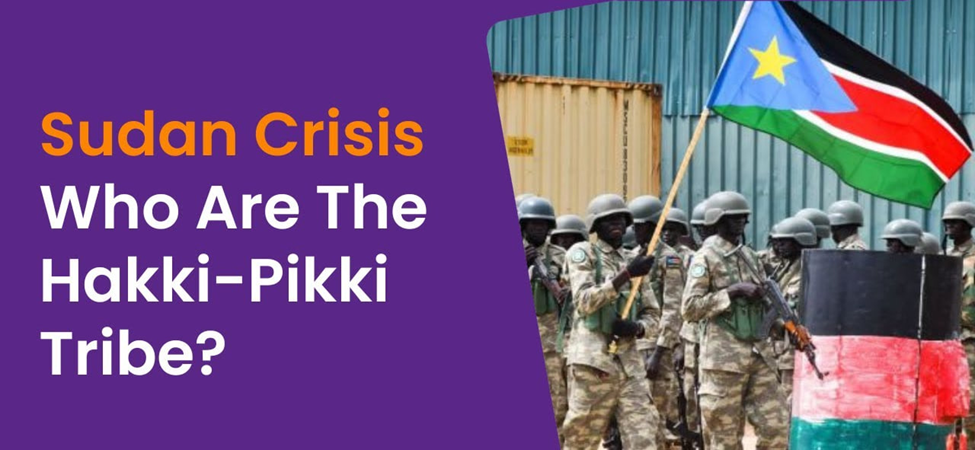Description

Copyright infringement not intended
Context: Tribals from Karnataka's 'Hakki-Pikki', a semi-nomadic tribal community, are stuck in violent Sudan.
Details
- Thirty-one members of the 'Hakki-Pikki' tribe are stuck in Sudan, where violent confrontations are ongoing between an elite paramilitary force and the country's armed forces.
- The Hakki-Pikki had run out of food since the riots began this weekend.
- According to the Karnataka State Disaster Management Authority, the Ministry of External Affairs (MEA) has been informed about the status of the tribals in Sudan.
- The stranded people have been advised not to leave their current location and to follow the counsel of the Indian Embassy there.
- India is working closely with other countries to ensure the safety and security of its citizens in Sudan.
.jpeg)
Hakki-Pikki Tribe
Background
- The HakkiPikki is a Kshatriya or warrior tribal community who had to migrate to South India after being defeated by the Mughals.
- 'Hakki' means 'bird' in Kannada, and 'Pikki' means 'to catch'. As a result, the group is known as the 'bird catcher,' referring to their traditional work.
- Hakki-Pikki has a population of 11,892 people, according to the 2011 census.
About
- It is a nomadic community that originated in the forests of Karnataka.
- It is a Scheduled Tribe of Karnataka.
- They are also known as Kirshaka Bandi, which means "farmers' enemies" because they used to raid the crops of the settled farmers.
- They are well-known for their traditional medicines. For a long time, the group lived in the deep woods and developed its plant and herb-based medicinal systems.
- Traditional medicinal knowledge of the Hakki-Pikkis is in high demand in numerous African countries. As a result, for many years, community members have travelled to the continent.
- They have their dialect, which is a mixture of Kannada, Telugu, Tamil, and Marathi.
Social Structure
- The tribe has a unique social structure, based on clans and sub-clans.
- Each clan has a headman, called a Nayaka, who is responsible for the welfare and discipline of the clan members.
- The Nayaka also acts as a mediator in case of disputes or conflicts among the clan members or with other clans.
- The tribe follows a matrilineal system of inheritance, where property and wealth are passed down from mother to daughter.
- Women also have more authority in decision-making and leadership roles within the family and the community.
Life Style
- The Hakki Pikki tribe has a distinctive way of life, which is influenced by their nomadic nature.
- They live in temporary huts made of bamboo and grass, which they dismantle and carry with them when they move to a new place.
- They wear colourful clothes and ornaments, made of beads, shells, coins, and feathers.
- The tribe has a rich and diverse culture, with their language, customs, beliefs, and traditions.
- Scholars dubbed their mother tongue "Vaagri." They communicate in 'Vaagri' at home but speak Kannada daily.
- UNESCO has designated 'Vaagri' as one of the endangered languages.

Economic Activities
- They follow a mixed economy that involves hunting, gathering, farming, fishing, and trading.
- After bird hunting was prohibited, they began doing odd jobs like working in fields and sharpening knives and sickles while riding their bicycles around towns.
- They also collect honey, fruits, roots, herbs, and medicinal plants from the forest.
- They cultivate crops like rice, millet, maize, and vegetables on leased land or as sharecroppers.
- They trade their products with other communities or sell them in local markets.
- They are famous for their handicrafts, which they make from animal bones, horns, feathers, skins, shells, beads, and metal.
- They also sell the herbal treatments that they produce.
Religious Beliefs
- They practice animism, which is the belief that all living and non-living things have a spirit or soul.
- They worship various gods and goddesses, such as Mariamma, Beerappa, Maramma, and Kariyamma.
- They also believe in magic, witchcraft, and sorcery, and consult shamans or healers for curing diseases or solving problems.
|
PRACTICE QUESTION
Q. Which of the following statements is incorrect about the Hakki Pikki tribe?
A) They are a nomadic tribe of hunters and gatherers who live in temporary settlements made of bamboo and thatch.
B) They follow a patrilineal system of inheritance where property and authority are passed on through the father's line.
C) They have their dialect which is a mixture of Kannada, Telugu, Tamil, and Marathi.
D) They make various handicrafts from animal bones, horns, feathers, skins, shells, beads, and metal.
Answer: B
|

https://www.indiatoday.in/india/story/hakki-pikki-karnataka-sudan-clashes-violence-traditional-medicines-2361940-2023-04-19











